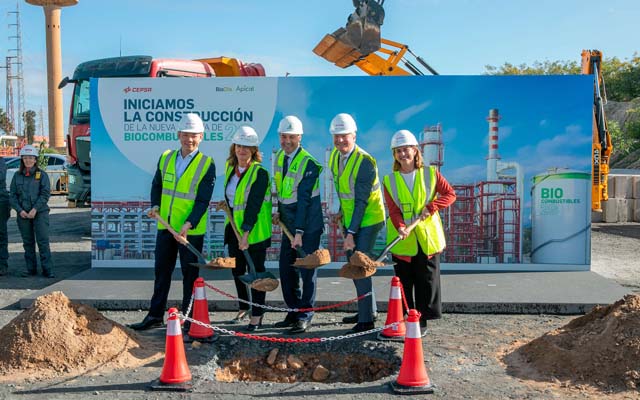Spanish energy company Cepsa and Bio-Oils, a subsidiary of Apical, are beginning construction in Huelva, Spain, of what is said to be the largest second-generation biofuels plant in southern Europe.
The new facility, which will flexibly produce 500,000t of sustainable fuel annually, will allow the joint venture formed by both companies to double its current production capacity. The new 2G biofuels plant, along with the existing facilities operated by Cepsa and Bio-Oils in Huelva, will form the second largest renewable fuel complex in Europe, with a total production capacity of 1m tons per year. Start-up is planned for 2026.
The new facility, whose start-up is planned for 2026, will be in Palos de la Frontera (Huelva), next to La Rábida Energy Park. Its development involves a 1.2-billion-euro investment and the creation of 2,000 direct and indirect jobs during the construction and operation phases.
Maarten Wetselaar, CEO Cepsa, said: “Today we are breaking ground on our second-generation biofuels plant, the first major milestone of our Positive Motion strategy. This strategic project for Spain and Andalusia will make us a European benchmark in the field of green molecules and facilitate the immediate decarbonization of sectors that cannot run on electrons. This is the start of a new chapter for Cepsa and this region that will generate quality employment and a new era of industrialisation.”
Pratheepan Karunagaran, Executive Director Apical, added: “The availability of sustainably available feedstock remains a challenge for many countries. As we continue to expand Apical’s global footprint and capacities, the availability of waste and residue is set to grow in tandem, enabling value-added partnerships to be forged for our waste stream to drive the production and adoption of sustainable fuel. Our 2G biofuels plant with Cepsa is an excellent example of how industry players can come together to unlock the potential and scale up adoption in an affordable manner.”
The new plant, which will be built with the latest technology for the production of renewable fuels, will have a minimal environmental impact. Thanks to the consumption of renewable hydrogen, 100% renewable electricity and different heat recovery and energy efficiency systems, this facility will emit 75% less CO2 than a traditional biofuel plant and is designed to achieve net zero emissions in the medium term. Likewise, it will not consume fresh water, but will only use reclaimed water, and its water emissions will have a minimal impact on the ecosystem thanks to a powerful water treatment plant. The facility will also be digitally native and will incorporate the latest advances for the industry in artificial intelligence, internet of things (IoT), and data analysis.
It will enable the development of other key projects to reposition Spain and Andalusia in the international energy landscape. In addition to sustainable aviation fuel and renewable diesel (HVO), the plant will produce biogas, a fundamental raw material for the production of green hydrogen, essential for the decarbonisation of industry. Another product captured from the treatment of biogas – biogenic CO2 – is essential for the production of green methanol to decarbonise maritime transport. As such, this project is a key element of the entire Andalusian Green Hydrogen Valley ecosystem being led by Cepsa.
The initial work will include the start of marine construction at the southern pier of the Port of Huelva given that the project also encompasses the development of auxiliary facilities in the port necessary for its operation. The new plant will secure the majority of its raw material supply from organic waste such as agricultural waste and used cooking oils through a global, long-term agreement with Apical, enabling it to address one of the main challenges facing the industry: access to raw materials. 2G biofuels promote the circular economy by using waste for their production that would otherwise be discarded or end up in landfills.
Biofuels are seen as a present-day solution to accelerate the decarbonisation of transportation, a sector that currently accounts for 15% of global CO2 emissions. They are a strategic technology for achieving an immediate energy transition that can reduce CO2 emissions by up to 90% compared to traditional fuels, making them a key element in promoting the decarbonization of land, sea, and air transportation.
Since 2022, Cepsa has been producing and marketing 2G biofuels to its customers in the aviation, maritime, and land sectors. The energy company offers biofuels in 60 Spanish ports.
Cepsa and Apical break ground for new 2G biofuel plant (source: Cepsa)



